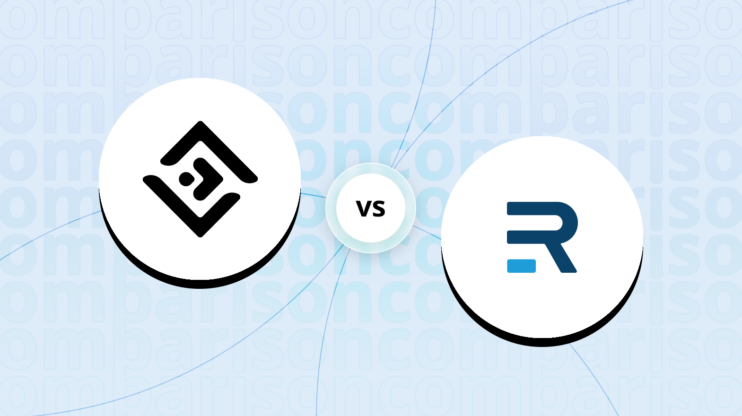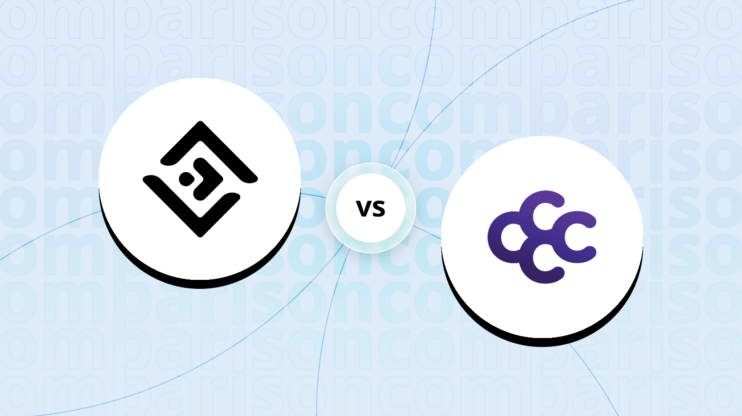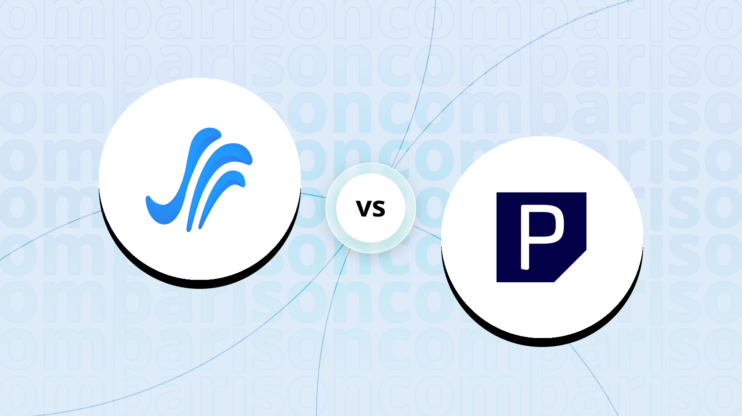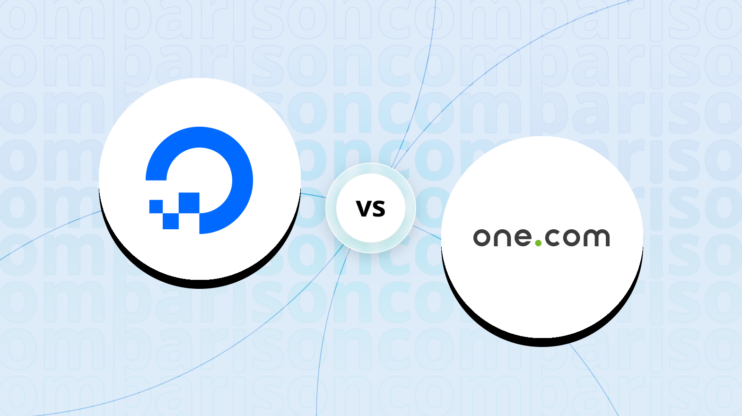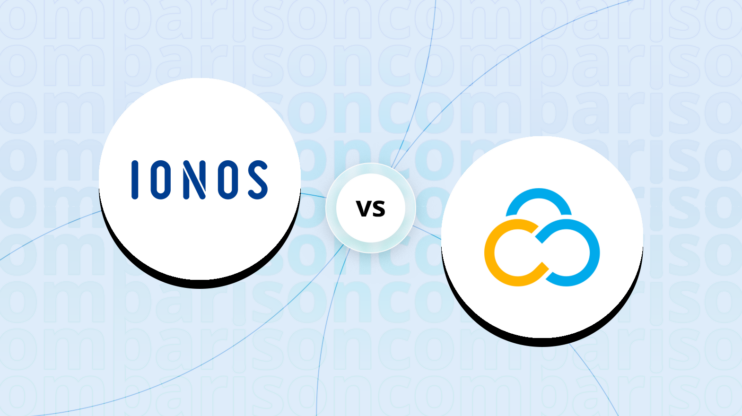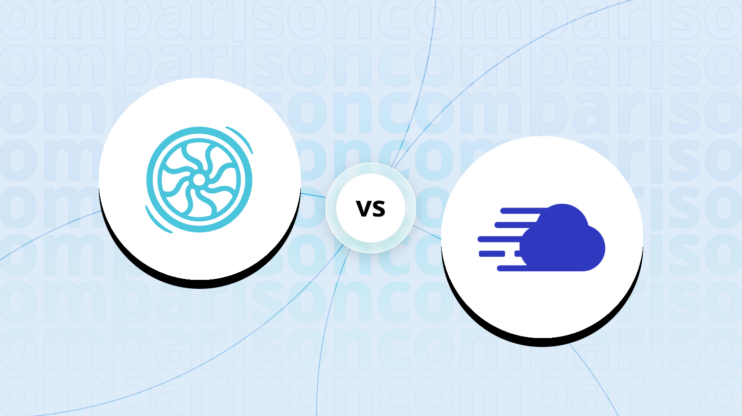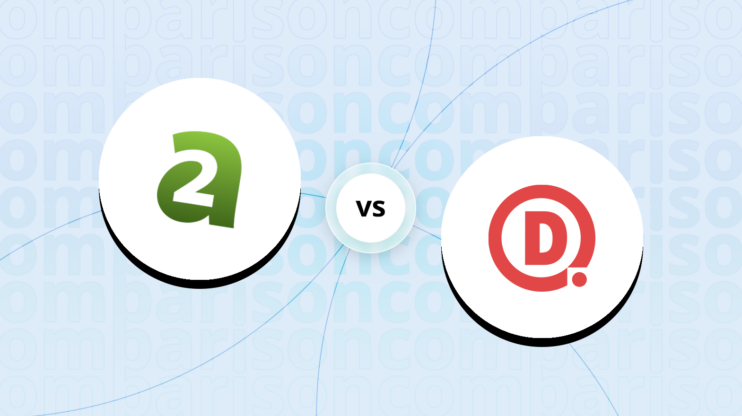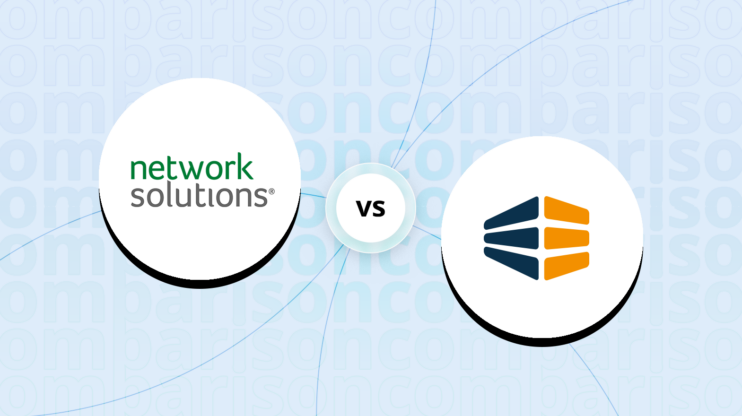Final verdict
Looking over 10Web vs. Pagely, both hosting services bring unique strengths to the table, each suited for different user needs.
-
10Web (Overall grade: 8.8)
offers a highly user-friendly experience with advanced AI tools, making it a standout option for agencies, ecommerce sites, and those focused on rapid deployment and management. Leveraging Google Cloud’s infrastructure, 10Web provides excellent uptime, scalable resources, and strong security features. The platform’s affordability and tools like an AI Website Builder, free custom domains, and comprehensive backups cater to a wide range of users, including beginners. However, it lacks VPS hosting and native email services, which could be a downside for users needing these specific features.
Pagely (Overall grade: 8.1)
excels in performance and scalability, making it ideal for high-traffic and multimedia-heavy websites. Powered by AWS, it offers robust performance, superior caching, and extensive security features. The platform is especially valued by enterprise-level clients for its high-level customization and managed services. While Pagely stands out with features like PressARMOR™ and PressCACHE™, it comes at a higher price point which might not be suitable for budget-conscious users. Additionally, its more complex administrative controls and lack of a built-in website builder can be limiting for less technical users.
Both hosting providers have their merits, and the best choice ultimately depends on the specific needs and budget of the user.
 Overall grade:8.8 |
 Overall grade:8.1 |
|
|---|---|---|
| Uptime and Availability | 9.7 | 9.5 |
| Hosting Performance | 8.6 | 8.8 |
| Hosting Security | 8.6 | 9.2 |
| Price | 8.8 | 7.4 |
| Hosting Features | 7.7 | 4.6 |
| Ease Of Setup | 9.1 | 8.2 |
| User Management | 8.6 | 8.4 |
| Customer Support | 9.3 | 8.9 |
| User feedback | 4.5/5 | 4.9/5 |
Hosting types offered
Both platforms provide a variety of hosting types, each designed to meet the different needs of users.
 |
 |
|
|---|---|---|
| Shared hosting | ||
| Cloud hosting | ||
| WordPress hosting | ||
| Ecommerce hosting | ||
| VPS hosting | ||
| Dedicated hosting |
Although both offer a variety of hosting plans tailored to different needs, in
certain cases, one platform may prove to be more suitable.
Detailed comparison
Uptime and availability
Evaluates the average uptime statistics, uptime guarantee and overall availability of the hosting
provider
Score Components:
- Uptime percentage (30%): evaluates the uptime statistics in given period of time
- Uptime guarantee (20%): Assesses if the platform offers an uptime guarantee and
whether the actual uptime matches the promised guarantee. - General performance (25%): Evaluates how fast is the average response time and overall
it’s stability. - Responsiveness (10%): Adaptability to different devices and screen sizes.
- Availability (25%): Reflects the total downtime and number of outages.
 9.7
9.7
 9.5
9.5
🏆 Winner
10Web: Offers superior features and reliability for uptime and availability.

10Web guarantees a 99.99% uptime, leveraging Google Cloud Platform to ensure fast and secure website data transport. The use of Google Compute Engine, Nginx, FastCGI caching, and LXD containers adds an extra layer of performance and reliability. With 12 data centers worldwide, 10Web minimizes data transfer times, ensuring your website remains online. The complete isolation of each WordPress site within Linux containers further enhances security and site stability.
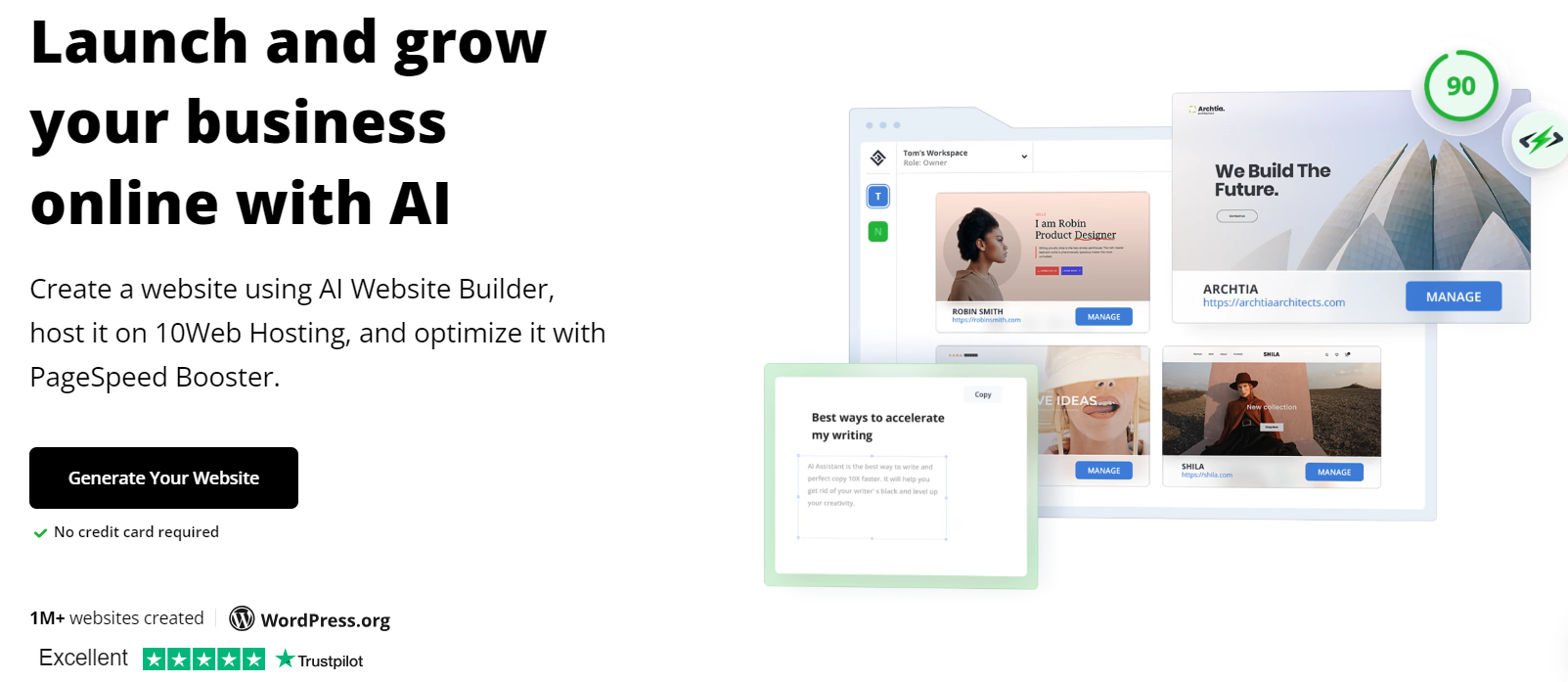
Pagely also guarantees 99.99% uptime and boasts a high availability architecture with multiple redundant features. With 14 global data centers and 24/7 uptime monitoring, Pagely offers significant reliability and fast average response times of 211ms. The automatic load balancing and emergency fallback features ensure uptime is maximized even during high traffic. The platform’s disaster recovery and custom hosting configurations are ideal for larger enterprises willing to invest in high reliability.
Hosting performance
Score Components:
- Hosting speed (30%): This includes SSD quality, Load times, PageSpeed score ranges,
additional information on website speed, built-in plugins for performance enhancement, available caching
methods, and CPU/RAM options - CDN (20%): Considers whether CDN is available or not, whether it’s free or paid, and
the quality of the CDN service - Available data centers (30%): Evaluates the number of data centers and their locations
globally. - Scalibility (20%): Looks at whether elastic scaling is available, the process required
to scale (manual upgrade vs. automatic scaling), the presence of dedicated servers, and the costs
associated with scaling.
 8.6
8.6
 8.8
8.8
🏆 Winner: Pagely: High-end hosting with superior support and scalability.
When comparing the general performance of 10Web and Pagely, several key aspects come to light. Both services utilize top-tier SSDs, but 10Web benefits from Google’s advanced servers and Cloud infrastructure, offering a PageSpeed score of 90+. Pagely, on the other hand, doesn’t specify a PageSpeed score but focuses on high-capacity vCPUs and RAM. Caching techniques are available on both platforms, with 10Web providing full-page caching through Cloudflare and Pagely using advanced caching and CDN technology. Both offer CDN services, but 10Web includes a free Cloudflare Enterprise CDN, while Pagely offers CDNs integrated with AWS, potentially at an additional cost. 10Web relies on Google’s global data centers, while Pagely’s infrastructure specifics need direct inquiry for detailed locations.
Website speed
Website speed is a focal point for both 10Web and Pagely. 10Web uses PHP 8, Nginx, and several optimization techniques to ensure a 90+ PageSpeed score. The performance is further boosted by CSS, HTML, and JS minification, as well as image and video lazy loading for faster load times. Pagely emphasizes high availability and speed through load-balanced and flexible configurations. With decoupled database resources and superior CDN technology, Pagely ensures fast website speed but doesn’t provide a specific PageSpeed benchmark.
Scalability
Scalability differs significantly between the two services. 10Web offers elastic scaling that automatically ramps up resources during traffic spikes, costing $2 for every extra 10,000 visitors or 5GB SSD storage at the end of the billing month. Pagely provides multiple scalable plans with flexible configurations, though the specifics about automatic scaling are not clear. Pagely’s high availability plans start at $1249/mo, and custom plans offer dedicated resources tailored to enterprise needs.
Hosting security
and regulatory requirements
Score Components:
- Technical security measures (40%): This includes encryption, firewalls, DDoS
protection, secure configurations, server monitoring, access control and availability of security addons
(e.g Sitelock security). - Operational security measures (30%): Encompasses data privacy, backups and data
redundancy. - Compliance and certifications (20%): Adherence to legal and regulatory requirements
(e.g., GDPR, HIPAA) and possession of certifications (e.g., ISO 27001, SOC 2). - Business and reliability (10%): Factors in the provider’s reputation, uptime
guarantees, and customer support.
 8.6
8.6
 9.2
9.2
🏆 Winner Pagely: Pagely offers a robust suite of security features and excellent compliance credentials.
Both 10Web and Pagely, have notable differences in their approaches to technical and operational
security, as well as in their compliance with regulations.
Technical security measures:
10Web and Pagely offer a variety of technical security features to protect their clients. 10Web provides free SSL certificates from “Let’s Encrypt” and automatic renewals. Pagely supports Let’s Encrypt and custom SSL certificates. For PHP versions, 10Web supports the latest versions which can be managed from the dashboard, whereas Pagely provides long-term support for PHP versions 7.4 or newer through its Zend add-on. Both 10Web and Pagely engage in regular malware scanning, but Pagely adds real-time threat detection and a proprietary web application firewall. 10Web also conducts regular security scans and maintains 24/7 defense against DDoS attacks.
Operational security measures:
Both 10Web and Pagely place a high value on operational security. 10Web employs 24/7 monitoring, login attempts limiter, and suspicious activity alerts. Pagely offers advanced operational security measures including DDoS protection through AWS Shield Standard, real-time monitoring, and thorough incident response protocols. For resource isolation, 10Web uses Linux containers for complete site isolation, whereas Pagely ensures dedicated memory, CPU, and other resources for total resource isolation. Both providers enforce two-factor authentication (2FA) and strong passwords to enhance account security.
Compliance and certifications:
10Web and Pagely show commitment to meeting various regulatory requirements. Both providers ensure GDPR compliance, but 10Web states that a detailed GDPR compliance statement is forthcoming. Pagely, on the other hand, has both Type I & Type II SOC 2 certification and meets GDPR by hosting data within local European jurisdictions. For PCI DSS compliance, 10Web uses PCI-compliant processors like PayPal and Stripe, while Pagely has an Attestation of Compliance.
 |
 |
|
|---|---|---|
SSL certificate |
Free Let’s Encrypt |
Let’s Encrypt and Custom SSL |
Additional security features |
Malware scans, 24/7 monitoring, firewalls |
AWS Shield, Web App Firewall |
PHP versions |
Latest versions supported |
PHP 7.4+ with Zend addon |
GDPR compliance |
Yes |
Yes |
HIPAA compliance |
Not specified |
Not specified |
PCI compliance |
Via PayPal and Stripe |
Attestation of Compliance |
Hosting features
Score Components:
- Domains (20%): Assesses the availability of a free domain, domain purchase options, and
pricing - Email (15%): Considers if the provider offers full email hosting, or is reselling
third-party service, and if the email is only transactional or not - Website builder (15%): Checks if website builder is available, and it’s user
friendliness and overall the level of customization allowed. - Staging environment (20%): Determines if a staging environment is available, allowing
for testing changes before going live. - FTP & SFTP accounts (10%): Evaluates if and how easily users can access FTP and
SFTP accounts - Git and SSH access (20%): Assess whether Git is integrated into the hosting service and
if SSH access is provided
 7.7
7.7
 4.6
4.6
🏆 Winner
10Web: Delivers a robust suite of tools and features, making it a top choice for managed WordPress hosting.
10Web and Pagely each bring different strengths to the table. 10Web provides a managed WordPress hosting service centered on speed, security, and ease of use, leveraging Google Cloud for top performance. It also offers AI-powered tools for website creation, SEO optimization, and ecommerce solutions, which can be a major advantage for users who need comprehensive functionality and automation. 10Web is budget-friendly, starting at $10 per month, and includes freebies like a custom domain for the first year and ample resources to accommodate site traffic spikes. On the other hand, Pagely, powered by AWS, targets more enterprise-level clients needing high reliability and customization, reflected in their higher pricing, starting at $375 per month. It emphasizes superior performance, flexible configuration, and extensive security features. Pagely also excels with tools like PressARMOR™ and PressCACHE™ for site performance and security.
 |
 |
|
|---|---|---|
Free domain |
Yes, for the first year |
No |
Free SSL |
Yes |
Yes |
Email hosting |
No |
No |
Website builder |
Yes |
No |
Staging environment |
Yes |
Yes |
FTP & SFTP accounts |
Yes (includes SSH) |
Yes (includes SSH) |
Git and SSH access |
Yes |
Yes |
Free backup |
Yes |
Yes |
Money back guarantee |
No |
No |
a location.
As a result in rare cases the features mentioned here can differ from the ones you see on their websites.
When comparing user-friendliness, 10Web shines with its AI Website Builder, providing ease for both beginners and advanced users through features like AI content generation directly in the Elementor editor. Its automatic backups, Cloudflare Enterprise CDN, and SEO tools further enhance its user-centric focus. Pagely, geared more for developers and companies in need of high-level customization, offers robust tools like SSH, GIT, and WP-CLI, along with more hands-on managed services. Both providers include SSL certificates and automatic WordPress updates, but 10Web has a slight edge with features like white labeling and a more accessible starting price point. Pagely’s strength lies in its dedicated AWS hosting, ensuring consistent performance at a premium.
Email services:
10Web and Pagely both lack native email hosting services. For transactional emails, both rely on integrating third-party services such as Google Workspace, Outlook, or Zoho. This approach allows users to set up and manage their email campaigns separately, adhering to their specific requirements for email communication.
Price
Score Components:
- Plan value (40%): What each pricing tier offers.
- Transparency and clarity (30%): Clearness of pricing structures.
- Flexibility of plans (20%): Range of options to suit different budgets.
- Hidden costs (10%): Additional expenses not included in the plan.
 8.8
8.8
 7.4
7.4
🏆 Winner 10Web: Offers a versatile range of hosting plans with advanced AI features.
Evaluating the pricing of plans among various hosting providers can be complex due to their differing pricing and renewal strategies. Additionally, certain plans require annual commitments, which adds to the difficulty of making comparisons. The prices listed are based on monthly commitments; plans requiring annual commitments are indicated. Additionally, although some providers offer identical plans for WordPress and shared hosting, we have created separate tables for each to enhance clarity.
Both 10Web and Pagely offer distinct hosting options, catering to different budgets and requirements. 10Web’s pricing ranges from $10 to $45 per month for its AI-enhanced plans, while Pagely’s offerings start at $199 per month and go as high as $3600 per month, focusing on high-end users. 10Web provides AI tools, real-time backups, and a Google Cloud Platform base, which justify its value for the price. Pagely emphasizes developer-friendly tools, managed DevOps support, and impressive storage and database resources. With its advanced tools, enhanced support, and competitive pricing, 10Web stands out as a cost-effective option for various needs.
 |
 |
|---|---|
|
AI Starter $20
1 website, 10GB SSD storage, 10K monthly visitors, 24/7 live chat support, free custom domain, SSL, 90+ PageSpeed score, AI tools. Value for price:9.0
|
Developer 1 $199
Not specific to WordPress only, 30GB SSD storage, dev tools, no cap on PHP workers, managed DevOps, decoupled DB resources. Value for price:7.0
|
|
AI Premium $30
1 website, 15GB SSD storage, 50K monthly visitors, enhanced support, unlimited AI image generation. Value for price:8.5
|
Developer 2 $299
Not specific to WordPress only, 30GB SSD storage, dev tools, no cap on PHP workers, managed DevOps, decoupled DB resources. Value for price:7.5
|
|
AI Ultimate $45
1 website, 20GB SSD storage, 200K monthly visitors, VIP priority support, free domain, SSL, AI tools. Value for price:8.0
|
Business Class $499
Custom features, DevOps support, developer tools, shell access, standard SLA. Value for price:7.5
|
 |
 |
|---|---|
|
N/A
Value for price:N/A
|
N/A
Value for price:N/A
|
 |
 |
|---|---|
|
AI Starter $20
1 website, 10GB SSD storage, 10K monthly visitors, free custom domain, SSL, 24/7 live chat, AI tools. Value for price:9.0
|
Performance Lite $375
50GB SSD storage, managed DevOps, no cap on PHP workers, decoupled DB resources, flexible config. Value for price:7.0
|
|
AI Premium $30
1 website, 15GB SSD storage, 50K monthly visitors, enhanced support, unlimited AI image generation. Value for price:8.5
|
Performance $499
50GB SSD storage, managed DevOps, no cap on PHP workers, decoupled DB resources, flexible config. Value for price:7.0
|
|
AI Ultimate $45
1 website, 20GB SSD storage, 200K monthly visitors, VIP priority support, free domain, SSL, AI tools. Value for price:8.0
|
Performance+ $999
50GB SSD storage, managed DevOps, no cap on PHP workers, decoupled DB resources, flexible config. Value for price:6.5
|
|
Agency Ultimate Custom
Multiple websites, customizable plans, real-time backup, dedicated Slack channel, 24/7 support, high-performance infrastructure. Value for price:8.5
|
Scale $2500
Custom storage and CPU, dedicated DB resources, managed DevOps, flexible config. Value for price:6.5
|
|
Dedicated Hosting Custom
High-traffic websites, dedicated resources, high-performance infrastructure, automated migration, 24/7 support. Value for price:8.5
|
Enterprise Class $2500
Multi-region redundancy, enhanced SLAs, dedicated TAM, compliance-ready. Value for price:7.0
|
As a result in rare cases the prices displayed here can differ from the ones you see on their websites.
Enterprise plans
10Web and Pagely cater to enterprise needs with customizable plans and high-performance features. 10Web’s Agency Ultimate and Dedicated Hosting plans provide real-time backup, security features, and Google Cloud infrastructure, making them flexible for various enterprise scenarios. Pagely offers extensive managed DevOps support and bespoke deployments in its Enterprise Class plan, ensuring robust performance and compliance-readiness.
Ease of setup
platform.
Score Components:
- Site migration (25%): Assesses whether the provider offers tools for site migration,
either automated or manual, and whether these services are free or require a fee. - Admin panel usability (35%): Evaluates the type of admin panel provided, such as the
standard cPanel or a custom solution, focusing on its accessibility and user-friendliness for both
technical and non-technical users. - Setup features (20%): Examines the availability and ease of use of various setup
features, including FTP accounts, file managers, email account setup, PHPMyAdmin, and easy CDN
configuration. - Help center quality (20%): Measures the quality and accessibility of the provider’s
help center resources, including articles and tutorials.
 9.1
9.1
 8.2
8.2
🏆 Winner 10Web: A highly intuitive and automated solution catering to seamless website setup and migration.
10Web utilizes a user-friendly custom admin panel that is highly accessible for both technical and non-technical users. The platform offers a streamlined dashboard loaded with powerful management tools, making navigation straightforward. Its AI Website Builder provides a unique, easy-to-use solution for website creation and migration, particularly beneficial for those with limited technical skills. Additionally, the simple 1-click staging environment enables users to experiment and implement changes confidently. The automatic real-time backups and updates further simplify site management, ensuring data protection and up-to-date software without manual intervention.
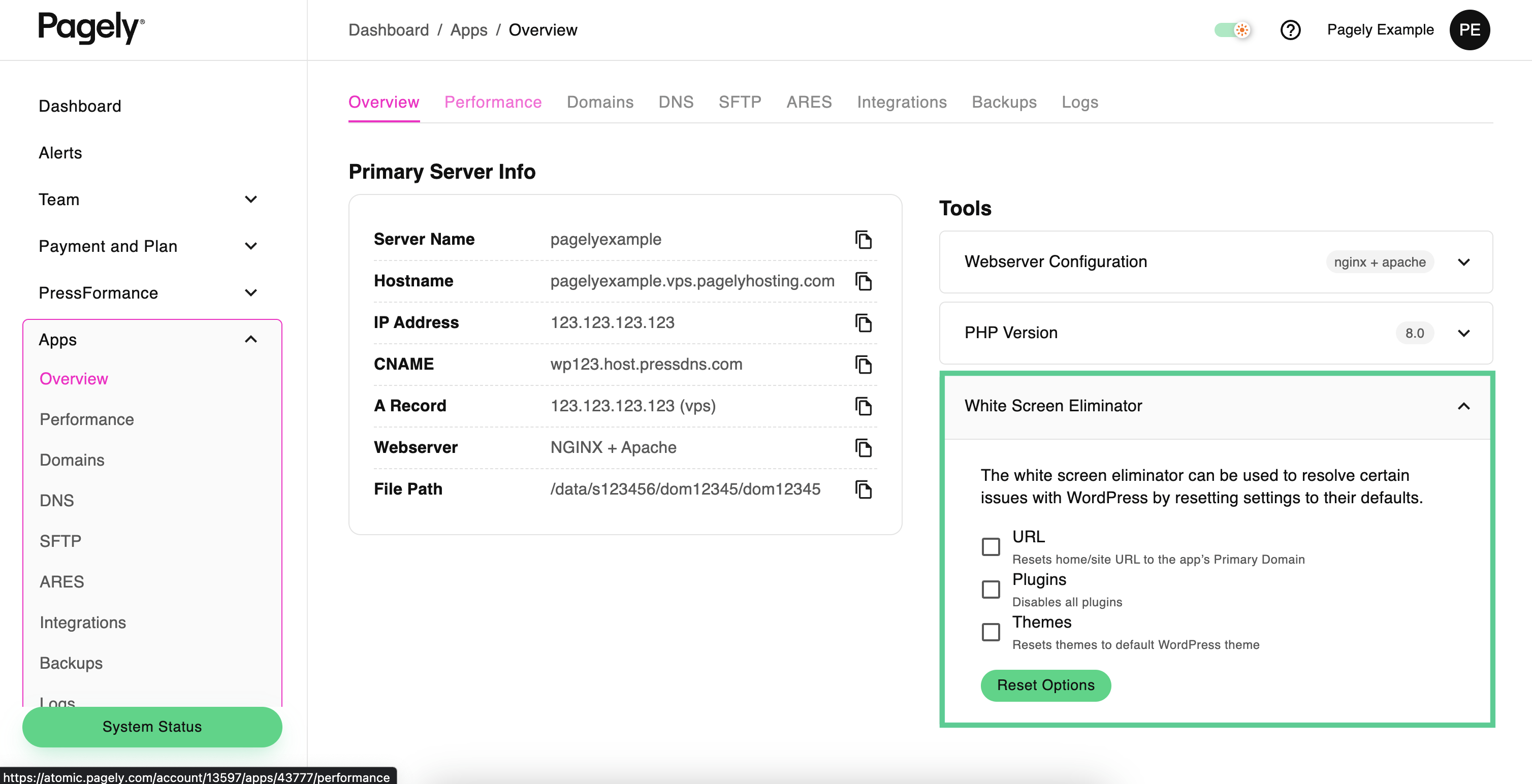
Pagely, on the other hand, opts for a more traditional, albeit robust, support infrastructure. The setup process can take up to one day, during which all essential configurations are handled. Pagely’s admin panel includes all the necessary tools for managing WordPress sites, offering support through ticket and chat systems. It caters well to those needing comprehensive control over multiple environments, such as deploying, staging, and maintenance. While it also provides an efficient structure, it requires a greater degree of manual interaction and familiarity with more technical aspects, making it slightly more complex for non-technical users compared to 10Web.
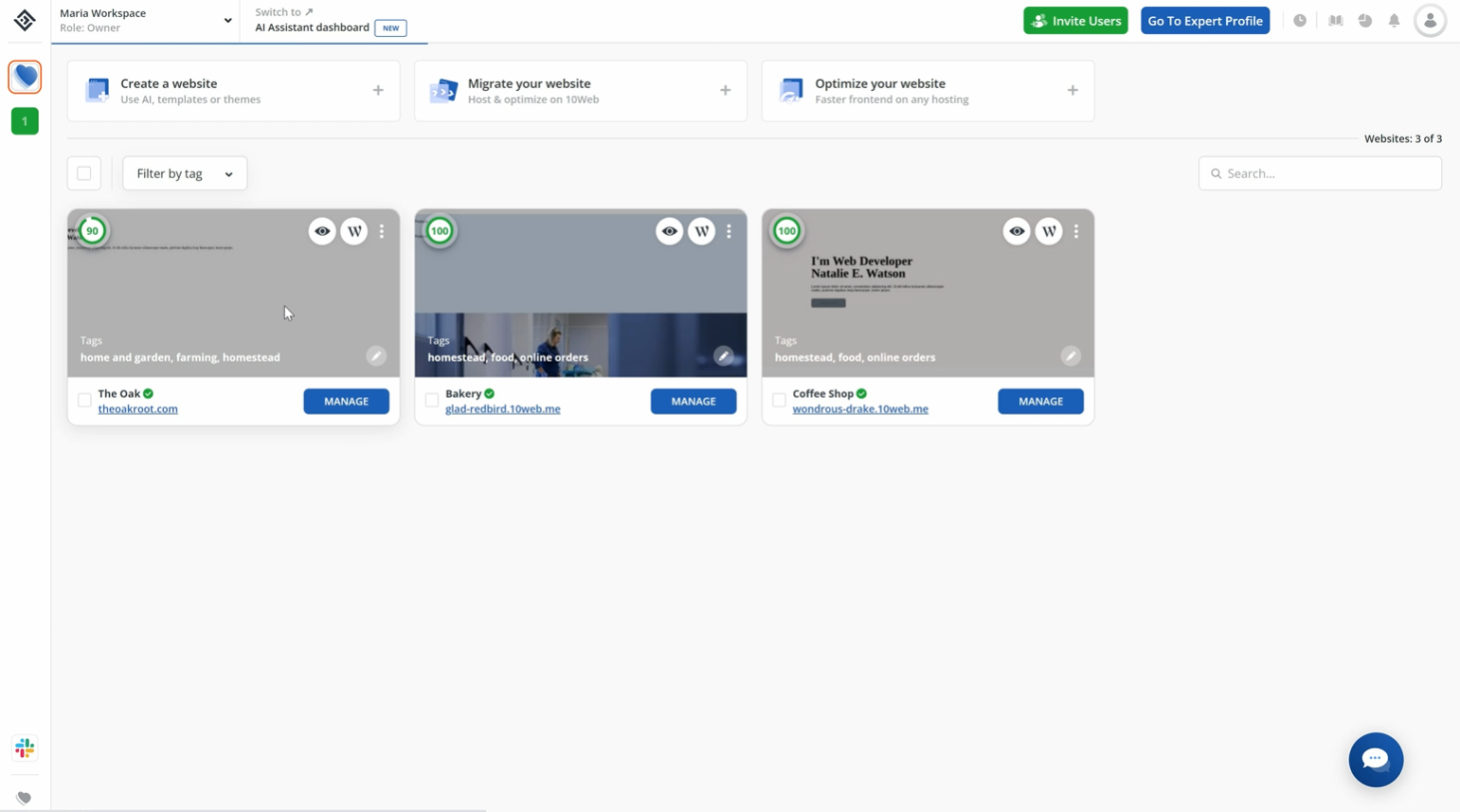
Both 10Web and Pagely offer various migration tools aimed at simplifying the transfer of websites. 10Web provides a highly automated 1-click migration process, allowing immediate and simple website transfers without requiring deep technical knowledge or manual intervention. In contrast, Pagely offers more structured support through ticket and chat systems, which can assist in the migration process, although this approach tends to be slower and may require some hands-on effort from the user.
The help center and knowledge base resources offered by 10Web are extensive, including video tutorials, real-time support via a dedicated Slack channel, and a public roadmap to keep users informed of new developments. This support framework ensures that all users, regardless of experience level, can find the help they need quickly and effectively. Pagely also provides a broad array of resources, including detailed articles on a variety of topics from troubleshooting to security and maintenance. Pagely’s comprehensive knowledge base and blog offer ample information but rely more heavily on the user’s initiative to seek out and apply this knowledge.
User management
accessibility.
Score Components:
- Role customization (40%): Flexibility in creating and defining user roles and
permissions. - Ease of management (30%): User interface and tools for managing users.
- Access control (20%): Effectiveness of access control measures for different user
levels. - Scalability (10%): Ability to manage a growing number of users efficiently.
 8.6
8.6
 8.4
8.4
🏆 Winner 10Web: Offers versatile user management and role definition capabilities tailored for diverse teams.
10Web and Pagely offer comprehensive user management features, yet they approach user roles and permissions differently. 10Web employs a range of roles, from Account Owner to Member, each designed to manage website access and functionality. It offers flexibility in modifying user roles, letting workspace admins tailor permissions to specific needs. Pagely, on the other hand, provides an extensive hierarchy including roles like Super-Admin, Sub-Admin, and Tech, each granting varying levels of administrative and technical access. This hierarchy allows for detailed role customization but may seem intricate compared to 10Web’s straightforward approach.
When it comes to user interfaces and tools for managing users, 10Web offers an intuitive dashboard where users can be easily invited, managed, and removed. The User & Team Management section centralizes these actions, making it easy to track user roles and permissions. Pagely also provides a user-friendly interface but leans more towards advanced administrative controls, catering to those who need to manage intricate permission settings. The layout is logical but can appear more complex for users unfamiliar with comprehensive role management.
For access control and scalability, both platforms effectively manage growing user bases. 10Web allows seamless switching between workspaces, supporting teams with varied projects. Its Role Manager feature aligns with WordPress user roles, which is beneficial for content management. Pagely’s approach, though detailed, ensures secure access by implementing 2-factor authentication and extensive SSH/SFTP key management, making it apt for technical administrators. Both platforms scale well, but 10Web’s more accessible interface may appeal to a broader user base.
10Web user roles table:
| Role | Description | Access highlights |
|---|---|---|
| Account Owner | Full permissions and overall account control. | Account settings, user management, website migration, full access to all features. |
| Admin | Complete workspace access except user management. | Add/remove websites, manage DNS, subscription, and billing details. |
| Contributor | Manages websites but no access to user management or billing. | Add/remove websites, but access excludes user roles and financial settings. |
| Member | Access to specific websites’ live/staging environments. | Designed for clients/developers; limited to specified site access. |
Pagely user roles table:
| Role | Description | Access highlights |
|---|---|---|
| Account Owner | Full account and site management | Account settings, billing, user roles, SSH/SFTP access, VPS server access |
| Super-Admin | Broad administrative access | Manage billing, site-level users, SSH/SFTP, backups, aliases, 2FA |
| Sub-Admin | Site and account-level management | Manage site-level users, SSH/SFTP, backups, aliases |
| Tech | Technical site administration | SSH/SFTP access, manage sites, backups, aliases |
| Billing | Handles financial details | Manage 2FA, SSH/SFTP, backups, aliases |
| App-Only | Limited to application-specific functions | Manage 2FA, SSH/SFTP, backups, aliases |
| App-Only-Minimal | Minimal application access | SSH/SFTP access, backups, aliases |
Customer support
hosting provider.
Score Components:
- Support communication channels (30%): Measures the variety of customer support types
provided (live chat, chatbot, email, phone, etc.) - Availability (20%): Assesses the availability hours for each channel, including 24/7
support options. - Technical support quality (30%): Assesses whether the provider offers comprehensive
technical support, including hardware upgrades (e.g., HDD to SSD), software installations, and web
server configuration changes. - Enterprise support (20%): Checks if there are dedicated or priority support services
for enterprise-level customers.
 9.3
9.3
 8.9
8.9
🏆 Winner
10Web: Offering comprehensive 24/7 live chat support, dedicated Slack channels, and VIP priority support, 10Web ensures your technical issues are resolved swiftly.
 |
 |
|
|---|---|---|
Phone support |
||
Live chat support |
||
Chatbot |
||
Email/ticket support |
||
Enterprise support (dedicated agent, priority support) |
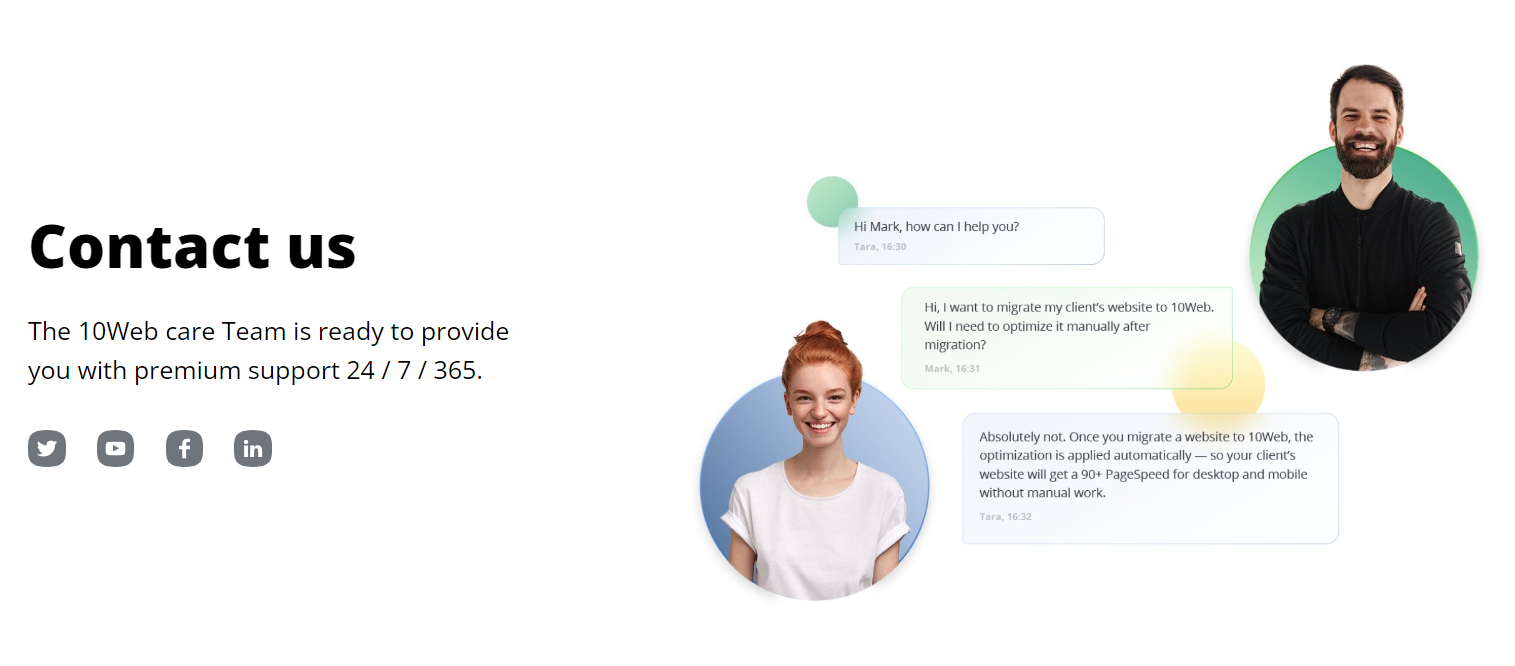
10Web and Pagely both offer extensive customer support but with differences that cater to various needs. 10Web impresses with its 24/7 live chat support, offering immediate responses anytime, and a dedicated Slack channel to connect directly with engineers for quick resolution. VIP Priority Support through real-time chatbox assistance and a dedicated account manager further emphasizes 10Web’s commitment to high-level support. Their Help Center with over 700 guides and articles serves as a valuable resource for troubleshooting and learning. Moreover, 10Web’s customer support statistics are notable: 25,000+ tickets annually, a 70 NPS score, and a 98% satisfaction rate in live chat.
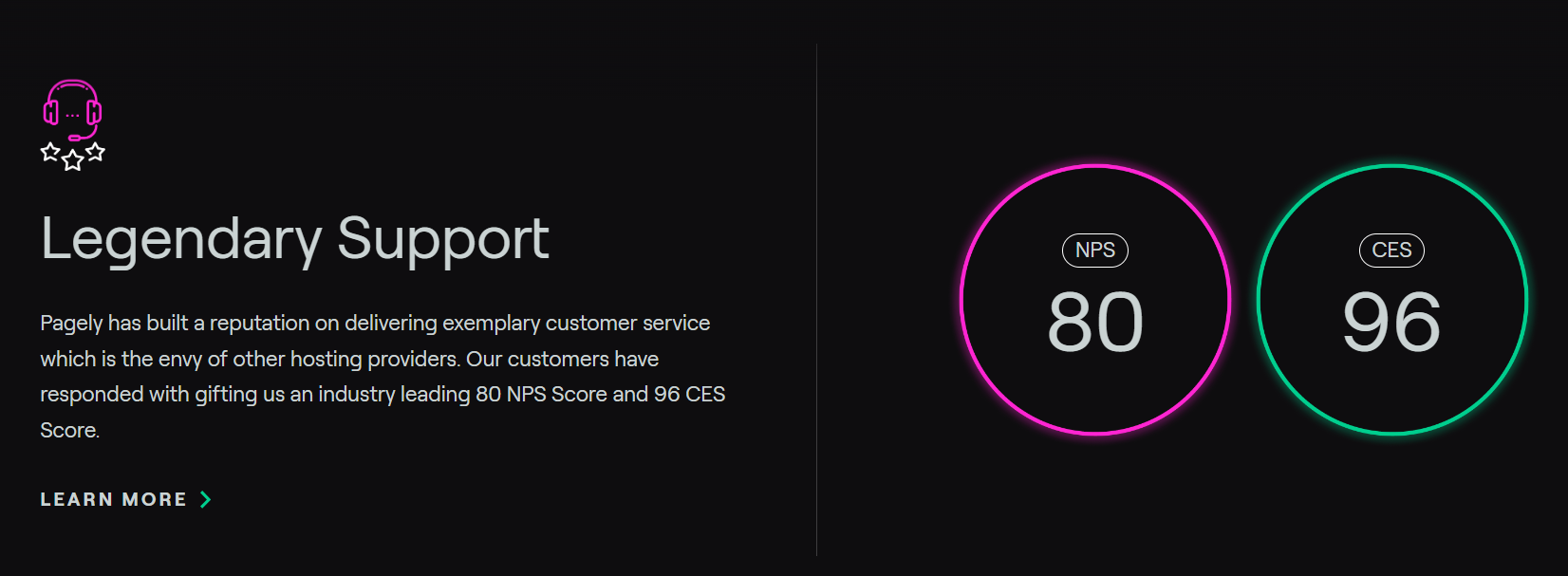
Pagely, on the other hand, provides 24/7 support ticket availability and live chat access through their Atomic portal. Unique to Pagely is their tierless support system where every support team member is capable of solving issues without escalation, ensuring issues are resolved quickly. Enterprise support is available via select plans and Slack channels during business hours. Pagely also boasts a strong track record with 81% case resolution within 2 hours and an impressive customer satisfaction rating of 97%. With a 96 CES and 80 NPS, they maintain high customer satisfaction levels and fast response times.
User feedback
Overall, users have highly praised this hosting provider for its exceptional customer service, noting the responsiveness and expertise of the support team. The platform is user-friendly, with features like AI-driven website building, easy site migrations, and integration with WordPress being standout points. While most reviews are positive, highlighting the ease of use and effective solutions provided by the support team, a few users mentioned occasional issues with plugins and a slightly higher cost compared to other providers. However, the advanced tools and customer support quality make it a valuable partner for businesses.
Overall, Pagely receives high praise from its users for its reliable and efficient WordPress hosting services. Reviewers particularly commend the exceptional and responsive customer support, likening it to having an on-call DevOps team. While the service is considered expensive compared to other hosting providers, users generally agree that the quality and peace of mind it offers are well worth the cost. Minor criticisms include the premium pricing and occasional interface bugs, but these are overshadowed by the consistently positive experiences with uptime, security, and problem resolution.
FAQ
Which platform is better suited for hosting WordPress websites?
Both 10Web and Pagely are well-suited for hosting WordPress websites, offering strong managed WordPress hosting solutions with advanced features and support. 10Web leverages Google Cloud for top performance and ease of use, ideal for beginners and businesses needing rapid deployment. Pagely targets more enterprise-level clients with high reliability and customization, making it ideal for those who need high-level customization and superior performance.
Are both platforms suitable for beginners?
10Web is more suitable for beginners due to its user-friendly custom admin panel and AI Website Builder, which simplifies website creation and management. It also offers automatic backups and Cloudflare Enterprise CDN, enhancing ease of use. Pagely, while powerful, has a more complex and traditional admin panel that may require a higher technical understanding, making it less beginner-friendly compared to 10Web.
What are the major differences in pricing and value between 10web and pagely?
10Web offers budget-friendly plans starting at $10 per month, making it accessible for a wide range of users with features like AI tools and free custom domains. Pagely’s pricing starts at $199 per month, targeting high-end users with enterprise-level needs and robust performance. While 10Web provides excellent value with affordable plans and comprehensive features, Pagely emphasizes superior customization and performance, justifying its higher cost for advanced requirements.
Which hosting service offers more scalability options for growing websites?
Pagely offers more extensive scalability options with multiple scalable plans tailored for high traffic and enterprise needs, featuring flexible configurations and dedicated resources. 10Web provides elastic scaling by automatically ramping up resources during traffic spikes at a minimal additional cost. However, Pagely’s high availability plans and managed DevOps support cater better to rapidly growing websites with complex needs.
What are the differences in the control panels offered by each hosting service?
10Web offers a custom admin panel that is designed for ease of use, featuring real-time backups, automated updates, and an AI Website Builder, making it more intuitive for both beginners and advanced users. Pagely provides a more traditional control panel with comprehensive features for developers, such as SSH, GIT, and WP-CLI, but the setup process is more complex and may require higher technical knowledge. 10Web’s streamlined interface focuses on simplicity, while Pagely’s intricate admin panel offers detailed control for advanced users.
The making of this blog
We followed a clear, step-by-step process to write and research this article.









